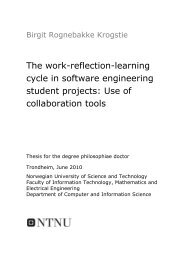Disputation Mikhail Fominykh - Department of Computer and ...
Disputation Mikhail Fominykh - Department of Computer and ...
Disputation Mikhail Fominykh - Department of Computer and ...
You also want an ePaper? Increase the reach of your titles
YUMPU automatically turns print PDFs into web optimized ePapers that Google loves.
CSCL at Work<br />
Collaborative Virtual Environments for Reflective<br />
Community Building at Work: the Case <strong>of</strong> TARGET<br />
Leif Martin Hokstad * Ekaterina Prasolova-Førl<strong>and</strong> * <strong>Mikhail</strong> <strong>Fominykh</strong><br />
Abstract In this article, we present initial results <strong>of</strong> designing a community, outlined<br />
in the TARGET framework. The main aim <strong>of</strong> the TARGET project is to research, analyze,<br />
<strong>and</strong> develop a new genre <strong>of</strong> technology enhanced learning environment – a reflective<br />
learning community integrated at the workplace that supports rapid access to competence<br />
development <strong>of</strong> individuals, namely knowledge workers within the domains <strong>of</strong> project<br />
management <strong>and</strong> sustainable manufacturing. The open question was: To what extent can<br />
3D collaborative virtual environments facilitate reflective dialogue in communities to<br />
support lifelong workplace learning? One possible answer is given in this case. The<br />
empirical study is held as a part <strong>of</strong> the TARGET International Summer School, which<br />
acted as a forum for the presentation <strong>of</strong> innovative approaches, developments, <strong>and</strong><br />
outcomes <strong>of</strong> research projects. The results <strong>of</strong> the study were analyzed to complement the<br />
TARGET community, seeding methodology as well as to provide implications for the use<br />
<strong>of</strong> 3D collaborative virtual environments for community building. In addition, TARGET<br />
illustrates how learning <strong>and</strong> working might be well integrated.<br />
Keywords <strong>Computer</strong> support * 3D collaborative virtual environments * Communities<br />
<strong>of</strong> interest * Community seeding methodology * Second Life<br />
Introduction<br />
TARGET is a large university <strong>and</strong> industry project, involving seventeen European<br />
countries, focused on the creation <strong>of</strong> a serious game for competence development in the<br />
areas <strong>of</strong> project management <strong>and</strong> sustainable manufacturing (www.reachyourtarget.org).<br />
In this article, we describe <strong>and</strong> discuss in detail the merits <strong>and</strong> results <strong>of</strong> using the<br />
TARGET International Summer School as a means to create a community in the workplace.<br />
In addition, we discuss initial results <strong>of</strong> a community seeding methodology, outlined in the<br />
TARGET community framework. We conducted a study in the virtual world <strong>of</strong> Second<br />
Life involving students, partners, <strong>and</strong> international visitors. The Summer School acted as a<br />
forum for the presentation <strong>of</strong> innovative approaches, developments, <strong>and</strong> outcomes <strong>of</strong><br />
research projects in the areas <strong>of</strong> technology enhanced learning, serious games <strong>and</strong><br />
collaborative technologies, facilitating the exchange <strong>of</strong> ideas between students, researchers<br />
<strong>and</strong> practitioners.<br />
Background<br />
The TARGET project has emerged out <strong>of</strong> a realization <strong>of</strong> the need for continuous learning,<br />
continuous adaption to changing market needs <strong>and</strong> the development <strong>of</strong> new skills <strong>and</strong><br />
practices. Innovation <strong>and</strong> organizational development is perceived as intrinsically<br />
connected to the ability <strong>of</strong> an organization to learn. In turn, learning is seen as a<br />
1
















